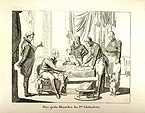Schrift: größer/kleiner
Inhaltsverzeichnis
Sie sind hier: WirRheinländer > english version > The Rhineland under the Prussians (from 1815)
The Rhineland under the Prussians (from 1815)
1815 - 1848
Restoration and Citizens' Revolution

With the proclamation of 5th April 1815. King Friedrich Wilhelm III took possession of the territories granted to him at the Congress of Vienna. Thereby the predominant part of what is today North Rhine-Westphalia became Prussian, and were politically reunited for the first time since the decline of the Carolingian empire.
At the Rhine and the Ruhr the first phases of industrialization were unfolding, which would herald the industrial revolution. The expansion of transport and traffic in the region proceeded rapidly on the one hand, while turning the developments of centuries upside down. What had been a centre of commerce or trade yesterday, could in a short space of time sink into insignificance, because it was disconnected from the new iron railways.

The Rhineland was greatly influenced by its time under the French and clung to many of the improvements achieved at that time, such as French civil and commercial codes, the chambers of commerce and the constitutional districts. In addition, the Rhineland was almost 80% Catholic and thereby quite different from the old Prussian regions, which were characteristically Protestant. The early industrialization at the Rhine and Ruhr, its favourable location for transportation and a strong, self-confident bourgeoisie in the towns provided a phase of modernization which had a positive effect throughout the Prussian empire.


